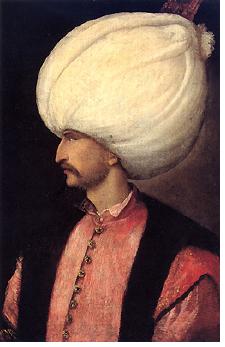Süleyman I,
the Magnificent, the Lawgiver
(Turkish: Süleyman I, Muhtesem, Kanuni)
Sultan of the Ottoman Empire, b. November 1494 or April 1495, d. 5/6 September 1566 (near Szigetvar, Hungary).
 Süleyman the Magnificent was the son of sultan Selim I and the grandson of Bayezid II, who appointed him sancak beyi (governor) of Kaffa on the Crimea. After Bayezid's death his father appointed him sancak beyi of Manisa in western Asia Minor. As a result Süleyman had ample experience in government when he became sultan after Selim's death in 1520.
Süleyman the Magnificent was the son of sultan Selim I and the grandson of Bayezid II, who appointed him sancak beyi (governor) of Kaffa on the Crimea. After Bayezid's death his father appointed him sancak beyi of Manisa in western Asia Minor. As a result Süleyman had ample experience in government when he became sultan after Selim's death in 1520.
Under Selim I the Ottoman empire had become the leading power of the Muslim world. Süleyman continued the policy of expansion of the empire and internal development through the establishment of social and logistical infrastructure, and he accelerated its cultural development.
Süleyman's first military activity was directed towards Europe. Belgrade fell to the empire in 1521, Rhodes was taken from the Knights of St. John in 1522. A first campaign against Hungary ended with the death of Hungary's king Louis II during battle in 1526. In the ensuing rivalry between Ferdinand I, Habsburg archduke of Austria, and John (János Zápolya), voivode (lord) of Transylvania, Süleyman accepted John as a vassal king of Hungary and secured his reign until his death in 1540.
Süleyman's campaigns against Persia were less decisive. After three campaigns in 1534 - 1535, 1548 - 1549 and 1554 - 1555 a peace between the Safavid rulers of Persia and the Ottoman empire was signed in 1555, but the eastern border remained unsettled.
The Hungarian situation had also become difficult when Habsburg showed renewed interest in Hungary after John's death. War with Habsburg dragged on until 1562, when Hungary was divided into a Habsburg possession, a region under Ottoman occupation, and Transylvania as an Ottoman vassal state.
Süleyman expanded the navy greatly. A naval victory in 1538 established the Ottoman Turks as the leading maritime nation in the Mediterranean region, only to be defeated in the Battle of Lepanto of 1571, five years after his death. In 1538 an Ottoman fleet sailed to India to attack the Portuguese possession of Diu but failed to take the city.
The rise of the Ottoman empire was underpinned by an administration of outstanding capability. Süleyman's statesmen and grand viziers (chief ministers), among them Ibrahim, Rüstem and Mehmed Sokollu in particular, were men of high intellect and unusual ability. Süleyman's attribute "the Lawgiver" is a reflection of the achievements of scholars such as Abu al-Su'ud (Hoca Çelebi) and Kemalpasade.
Süleyman's reign was a period of much public building activity including roads, bridges and aqueducts in Muslim cities such as Mecca, Damascus and Bagdad. Cities taken from the Christians were fortified with strong fortresses. Süleyman's architect Sinan was responsible for a vast social and religious building programme and several masterworks of Muslim architecture. At the end of his reign Süleyman had finally completed the transformation of Constantinople, the old Byzantine capital, into Istanbul, a Muslim capital fit for a great empire.
The arts flourished during Süleyman's reign, and much of the best poetry was written during the period. Süleyman was a skilled poet himself. The great Turkish poet Baki wrote many verses in his praise and an eulogy after his death.
The last decade of Süleyman's reign were interrupted by conflict with his sons. His son Mustafa had made himself unpopular in Asia Minor, and to pacify the situation Süleyman had him executed in 1553. His other two sons, princes Selim and Bayezid, began in 1559 to settle the question of succession through military action; it ended in 1561 with the defeat and execution of Bayezid. Süleyman died during a siege of Szigetvar in Hungary.
Image: public domain (Wikipedia)
home
 Süleyman the Magnificent was the son of sultan Selim I and the grandson of Bayezid II, who appointed him sancak beyi (governor) of Kaffa on the Crimea. After Bayezid's death his father appointed him sancak beyi of Manisa in western Asia Minor. As a result Süleyman had ample experience in government when he became sultan after Selim's death in 1520.
Süleyman the Magnificent was the son of sultan Selim I and the grandson of Bayezid II, who appointed him sancak beyi (governor) of Kaffa on the Crimea. After Bayezid's death his father appointed him sancak beyi of Manisa in western Asia Minor. As a result Süleyman had ample experience in government when he became sultan after Selim's death in 1520.